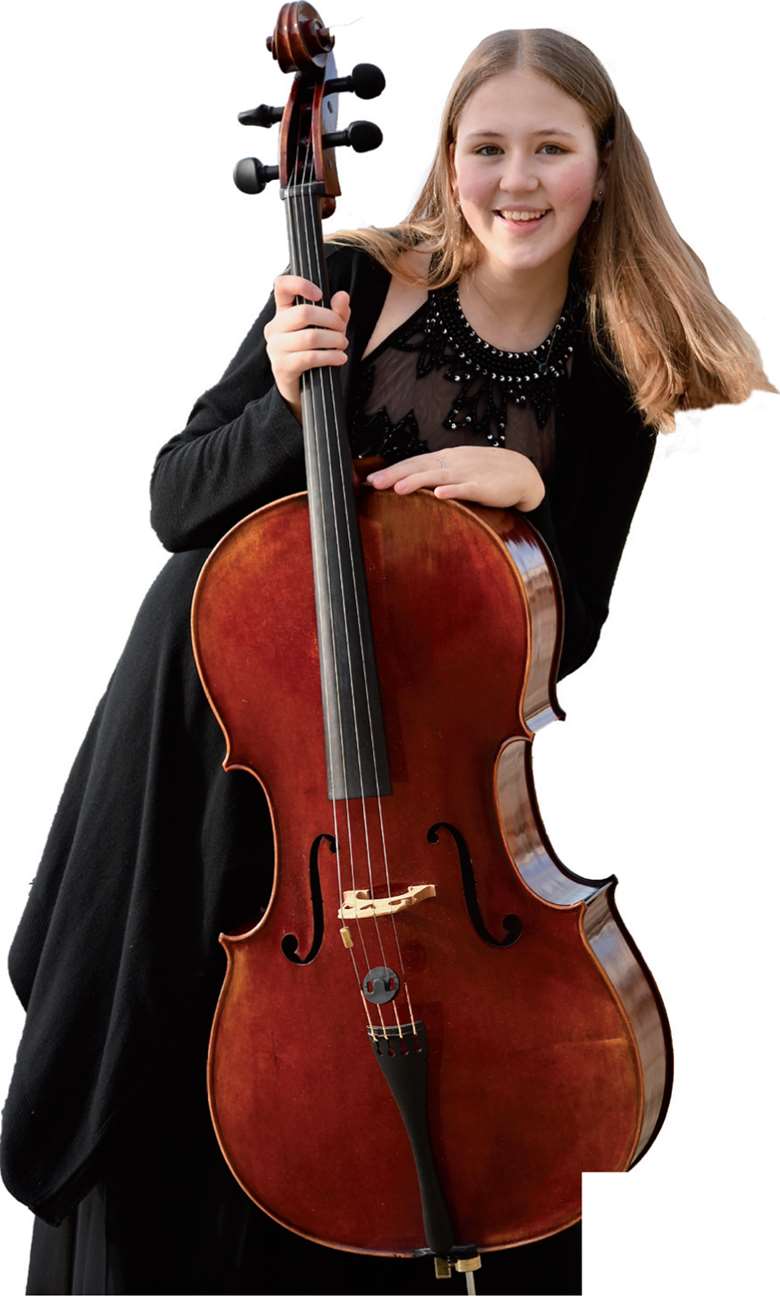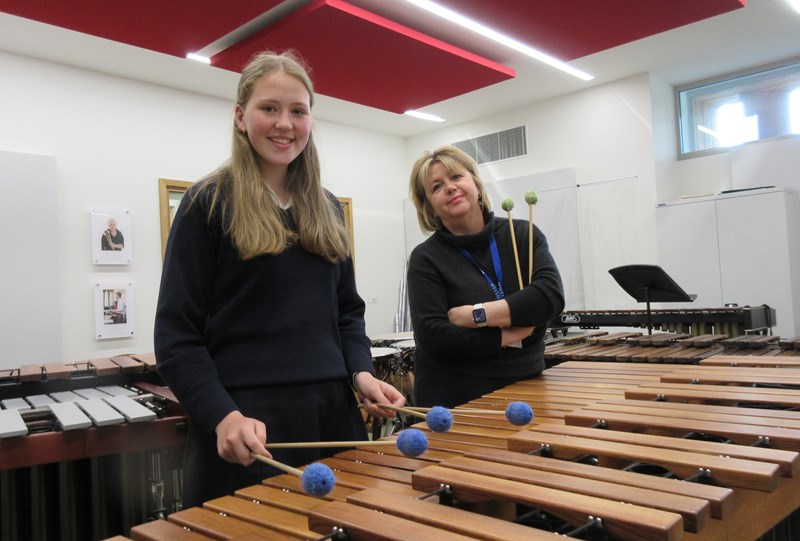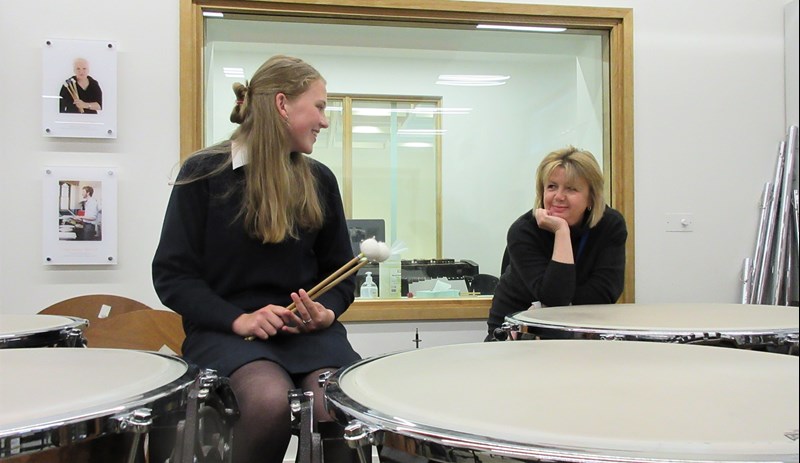She's on a drum roll: Wilamena Dyer
Harriet Clifford
Thursday, July 1, 2021
Fourteen-year-old Wilamena Dyer is already a highly accomplished musician. She also has Tourette's syndrome. Harriet Clifford speaks to Dyer and her percussion teacher, Jayne Obradovic, about learning music to an advanced level despite her disability

When Wilamena Dyer was nearing the end of her time at primary school, the tics she'd been experiencing since she was five became so debilitating that she couldn't get out of bed, walk, or eat on her own. Yet, most weeks, she would still attend her cello lesson. ‘My parents would sit there,’ Dyer explains, ‘and it was the only chance I had to get this respite and this escape. That's when we noticed the amazing power that music had on my tics.’
Having played cello since around the age of five – also the age at which she first started making small involuntary facial movements – the 14-year-old musician now attends Wells Cathedral School where she has an equal study between cello and percussion. Her scholarship at the specialist music school is funded through the government's Music and Dance Scheme and she boards in Somerset away from her family – Dyer's Cornwall-based parents are both artists and her sister, who also went to Wells, is now at music college. Despite having only started playing percussion on arrival in Year 7, Dyer is currently preparing for upcoming Grade 8 exams in both her disciplines.
Fully immersed
She was inspired to audition by her sister, as well as by her ‘supportive’ and ‘encouraging’ music teachers. Dyer says: ‘My sister is such an amazing musician and I've always looked up to her in that way. When it came to thinking about where I was going to go to secondary school, I thought, “Wouldn't it be cool if I could go where my sister went? I want to go to Wells.” I first auditioned on cello, and I thought it would be amazing to get in, but I wasn't really expecting anything. Then I got my place and I've loved it ever since.’ Dyer went to a small village primary school of only around 100 students where, she recalls, there was ‘quite a lot of music’. She laughs: ‘There were 30 violins – I was the only cellist. So, at the age of eight I joined a string orchestra for 16-year-olds and above, and there was little eight-year-old me not quite knowing what was going on but still enjoying it.’
Even through Zoom, Dyer is humble but quietly confident when she speaks, something I was fully expecting, having first seen her on the BBC website as one of two regional winners of this year's BBC Young Reporter competition, to which more than 2,500 11-to 18-year-olds submitted stories. In her video report entitled ‘Tourette's, Music and Me’, Dyer speaks to other musicians with the syndrome about their experiences, all of which are unique but have common threads. Most significantly, the interviewees speak about how their tics either stop completely or become imperceptible when they play. Now, I ask Dyer whether anything else has the same effect: ‘I think for me, music is probably one of the main things because it's so immersive and you've got so many things going on. But there are a couple of other things – sometimes when I'm watching something and my brain is occupied. I've heard of lots of other people who have a passion and when they do it their brain is so focused that they don't tic.’
 © Wells Cathedral School
© Wells Cathedral School
Wilamena and Jayne in a percussion lesson at Wells
Tourette's syndrome has no cure and its causes are unknown, but it is common for tics to become less noticeable ‘during activities involving a high level of concentration’ (NHS), and having experienced this herself, Dyer wanted to find out more. ‘I've always been interested in it as it's been such an important part of my life. I thought that there must be other people out there – it couldn't just be me who had discovered this!’ The first time she realised this must be the case was when she arrived at Wells and met one of the general music assistants: ‘He had Tourette's and was a percussionist, and it was great to see that role model. Now I've done lots of research and know that there have been famous people in the past – for example, Mozart was thought to have had Tourette's.’
Having been formally diagnosed with Tourette's syndrome at the age of nine, Dyer now runs a blog – ‘TicTastic’ – on which she aims to raise awareness of Tourette's and present an honest but uplifting portrayal of what it's like to grow up with the condition, particularly as a musician. As with her BBC report, one of the purposes of the fun, energetic videos she posts is to offer an alternative to widely accepted stereotypes. She says, ‘Tourette's can be stigmatised a lot. As soon as you say, “I have Tourette's”, people expect you to start shouting swearwords at them because that's what they know. That's all they've been told, therefore that's what they expect, so I'm really passionate about getting knowledge out there.’ When she was first diagnosed, she struggled to find encouraging stories of young girls (Tourette's is more common in boys) living with the syndrome. Telling me why she initially created her blog, Dyer says: ‘I think I wanted to be the young person, the young girl, who was having a tough time sometimes, but found positives and showed how I use my music and make something great with it.’
 © Wells Cathedral School
© Wells Cathedral School
Wilamena and Jayne in a percussion lesson at Wells
Musician first
Wells boasts the largest school percussion department in the UK. Jayne Obradovic, head of student experience and co-ordinator of percussion and summer schools, is Dyer's percussion teacher and has been living with her as a house parent this term. Joining the call, Obradovic is keen to caveat that, ‘First and foremost, she's Wilamena the musician, who happens to have Tourette's.’ She continues: ‘The programmes you see on television are basically about the swearing side of Tourette's, so I knew very little about it. But I think Wilamena has guided us all, and I think schools are generally much better now at giving teachers – music teachers in particular – information.’
Obradovic – whose impressive teaching career has seen her pupils reach the percussion finals of BBC Young Musician, as well as go onto secure scholarships at music colleges and conservatoires – says, ‘When children walk through the door, you don't know if they're neurodiverse or neurotypical and you kind of have to feel your way through it. Wilamena's blog and TV appearances have really helped us all as music teachers. But when she stands up and plays the marimba or sits down and plays the timps, we don't know, we don't notice it.’ Obradovic says that living with Dyer has changed her approach to their music lessons because she has seen how much energy her student has to put into her playing. ‘When she gets home, she's absolutely wiped. I've seen a different side to Wilamena's life in the last few months.’ She adds: ‘I'm just in awe of her, actually, how she copes with everything.’
Whether a conscious decision or not, controlling tics can be tiring. For Dyer, it's not something she'll be aware of until the end of the day. ‘I'll never be sat in a lesson suppressing my tics on purpose, but naturally you're so focused – there are lots of things going on and you're making sure your technique and sound are good. But I've never felt I have to suppress anything or try and hold anything in because I'm very comfortable with my music teachers.’
Remove the fear
Although not every young person will feel comfortable talking openly about their physical or mental health, Obradovic stresses the importance of ‘taking the fear out of teaching a neurodiverse child’. She continues: ‘Obviously, do your research and make sure your school has given you the support and information, but I think it's about not being frightened to ask questions. The main piece of advice I would give is just not to fear whatever is going on in the child's life – just try and be part of it however you can help.’ Dyer nods in agreement, before adding: ‘Communication is really important. I'd much rather my music teacher had a conversation with me about how my week went, rather than have a really intense lesson and at the end of it I'd be really tired and not feel well enough.’
Dyer's final question is a poignant one: ‘Music teachers are part of my life; why shouldn't they know what's going on in the rest of my life outside of that one hour in the practice room?’
‘Tourette's, Music and Me’ can be found on Wilamena's blog: www.tictastic.com

